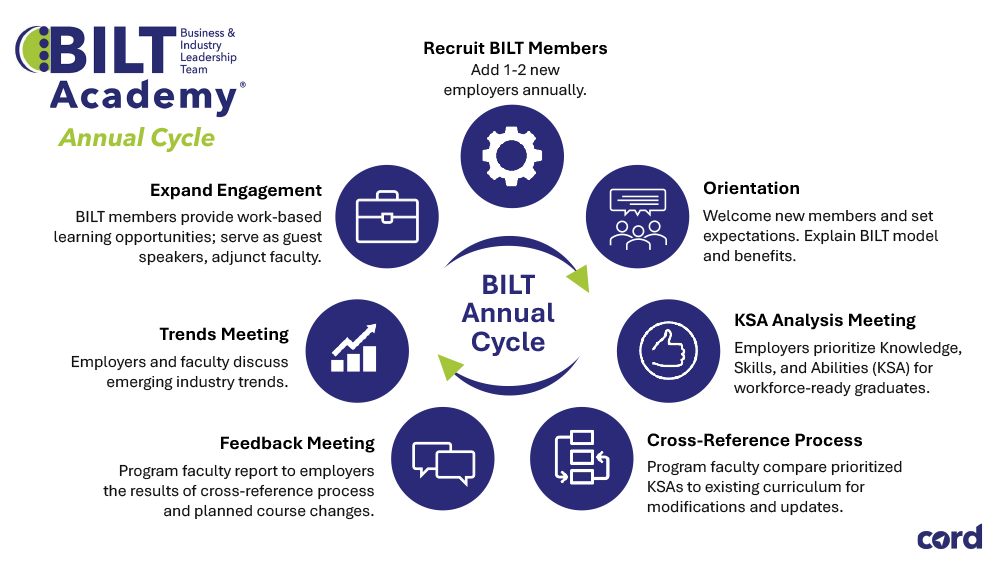
The BILT Model
 While every community college program seeks to guide students toward completion of certificates and degrees that will prepare them for employment, too often there is a mismatch between what employers need and what our curriculum teaches. The answer lies in getting local business and industry experts to actively participate in the process of steering coursework. The Business & Industry Leadership Team (BILT) model is a proven method for strategic employer engagement supported by the National Science Foundation Advanced Technological Education program. A BILT is different from a traditional advisory committee that might convene only once a year to approve curriculum presented by faculty. The BILT model insists that business and industry experts “co-lead” programs and validate the job skills students will learn. In other words, while an advisory committee advises, a BILT leads.
While every community college program seeks to guide students toward completion of certificates and degrees that will prepare them for employment, too often there is a mismatch between what employers need and what our curriculum teaches. The answer lies in getting local business and industry experts to actively participate in the process of steering coursework. The Business & Industry Leadership Team (BILT) model is a proven method for strategic employer engagement supported by the National Science Foundation Advanced Technological Education program. A BILT is different from a traditional advisory committee that might convene only once a year to approve curriculum presented by faculty. The BILT model insists that business and industry experts “co-lead” programs and validate the job skills students will learn. In other words, while an advisory committee advises, a BILT leads.
Learn more about the BILT Model
- Read Six Essential Elements of BILT
- Watch BILT 101 (30-min. video presentation)
- Review the checklist: Is BILT Right for Your College?
BILT Annual Cycle
The BILT Annual Cycle represents important engagement activities that should occur over the course of an academic year. It provides a clear roadmap colleges can follow each year to ensure consistent engagement, partnership growth, and program innovation. The Cycle’s schedule of activities can be customized to meet local needs.

BILT Success Spotlights
BILT Embedded in Strategic Plan
South Central College in Minnesota found the BILT model compelling because it puts industry partners in a co-leadership role, ensures all employer voices are heard and focuses on skills that will be needed in the future. The college has adopted the model for multiple programs, and their strategic plan now includes a goal to ensure students have the skills needed to succeed in the workforce through implementation of the BILT model. The college also incorporated the BILT model into its academic workplans.
BILT Drives Innovation
Miami Dade College (MDC) is a pioneer in developing programs focused on careers in Artificial Intelligence (AI). The AI BILT provides MDC faculty and staff with the latest AI trends and industry needs to inform up-to-date curriculum and meaningful experiential learning opportunities for students. The AI BILT consists of executives and technicians, from both large corporations and small companies, who understand the current and future state of AI nationally and what skills make graduates employable. Keeping curriculum current with business demands is the best way to ensure students are hired in this emerging field.
BILT Drives Economic Growth
At Bismarck State College (BSC) in North Dakota, the BILT model drives economic growth. BSC’s first BILT was established in response to an industry request for heavy equipment operators. BSC used the BILT process to create the program. This created trust and strong partnerships between BSC and employers, resulting in donated land and equipment to support the program. BSC has now adopted BILT across the college, establishing an institution-level BILT of key stakeholders from across the state, and divisional level BILTs for five key industry sectors. Program level advisory committees also follow the BILT framework.
Pathways to Innovation is a project of the Center for Occupational Research and Development supported by the National Science Foundation Advanced Technological Education Program [DUE 2039395]. Any opinions, findings, and conclusions or recommendations expressed in this material are those of the author(s) and do not necessarily reflect the views of NSF.
© CORD

